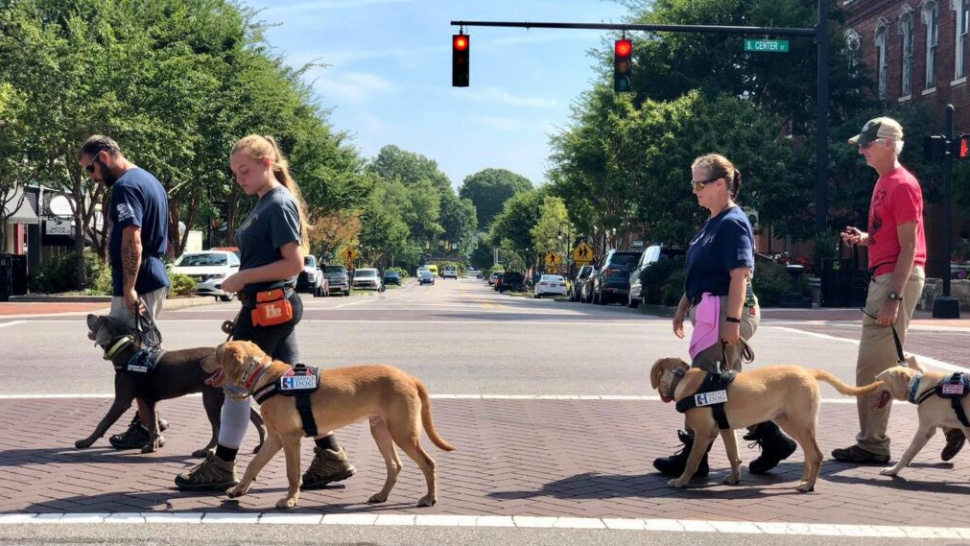For many individuals with disabilities, a service dog is more than just a pet—it’s a lifeline. These specially trained dogs provide essential assistance, offering support, independence, and even emotional well-being. If you’re considering a service dog, understanding the benefits, training process, and costs involved is crucial. Here’s why a service dog could be the perfect companion for your needs.
The Role of a Service Dog
A service dog is trained to perform specific tasks that help individuals with disabilities. From guiding the visually impaired to detecting seizures, these dogs provide invaluable assistance. Unlike emotional support animals, service dogs are granted public access rights, meaning they can accompany their handler in various settings, including restaurants, stores, and public transportation.
Key Aspects of Service Dog Training
Basic Obedience
A solid foundation in basic obedience is essential. Professional service dog trainers focus on fundamental commands like:
- Sit
- Stay
- Down
- Come
- Heel
These commands ensure the dog remains under control in any situation.
Task-Specific Training
The most critical aspect of training a service dog is task-specific training. Tasks are tailored to the handler’s needs and may include:
- Alerting to medical conditions (e.g., diabetes or seizures)
- Retrieving dropped items
- Opening doors or cabinets
- Providing stability for mobility-impaired individuals
- Interrupting harmful behaviors for individuals with PTSD or autism
Socialization
Proper socialization ensures that the dog remains calm and well-behaved in various environments. The process includes:
- Exposure to different people, sounds, and locations
- Familiarization with crowded areas
- Interaction with other animals
Distraction Proofing
A well-trained service dog must perform tasks reliably, even in distracting environments. Training methods focus on reducing reactivity to:
- Loud noises
- Other dogs and animals
- High-traffic areas
Public Access Training
To ensure that a service dog behaves appropriately in public, they undergo public access training. This includes:
- Navigating crowded spaces
- Lying quietly under tables in restaurants
- Ignoring distractions while working
- Remaining calm during flights and public transportation
Who Can Train a Service Dog?
Professional Trainers
Many individuals choose to work with professional dog trainers who specialize in service dog training. Experts such as Dennis Urrutia & Team in Miami provide Miami service dog training programs tailored to various disabilities.
Individual Training
While some handlers opt to train their own service dog, it requires extensive knowledge, commitment, and consistency. If you’re considering training a service dog yourself, be prepared for:
- Researching training techniques
- Consistently reinforcing commands
- Understanding public access laws
Important Considerations When Getting a Service Dog
Identifying Needs
Clearly define the tasks you need assistance with. This will help determine the most suitable service dog training program for your situation.
Puppy Selection
Not every dog is suited for service work. The best service dog trainers recommend choosing breeds known for their intelligence and temperament, such as:
- Labrador Retrievers
- Golden Retrievers
- German Shepherds
- Poodles
Ongoing Training
Training is a continuous process. Even after completing service dog training classes, regular reinforcement is necessary to maintain skills.
Service Dog Training Costs
The cost of service dog training varies based on factors such as the dog’s tasks and the trainer’s expertise. Here’s a general breakdown:
- Basic Obedience Training: $1,000 - $3,000
- Task-Specific Training: $5,000 - $25,000
- Fully Trained Service Dog: $15,000 - $50,000
While it’s a significant investment, the benefits of a well-trained service dog are invaluable.
Where to Find a Service Dog
There are multiple avenues for obtaining a service dog, including:
- Nonprofit organizations
- Private service dog training programs
- Professional trainers like K-9 Specialists
- Self-training with expert guidance
The Epidemic of Fake Service Dogs
With increasing awareness of service dogs, there has also been a rise in fake service dogs. Individuals who falsely claim their pet as a service animal can cause difficulties for legitimate handlers. It’s crucial to understand service dog certification Miami requirements and only support reputable training programs.
Questions to Ask Before Getting a Service Dog
Before committing, consider:
- What tasks do I need my service dog to perform?
- Do I have the time and resources for training?
- Will I work with a professional trainer or train my dog myself?
Service Dog Etiquette for Handlers
If you own a service dog, follow proper etiquette:
- Ensure your dog wears a service dog in training vest in public
- Educate others about not petting or distracting the dog while working
- Keep training consistent to maintain skills
Planes and How Service Dogs Will Be Affected
Air travel regulations for service dogs have changed in recent years. To ensure a smooth journey:
- Check airline policies before booking a flight
- Ensure your dog meets service dog certification Miami requirements
- Train your dog for long flights and crowded airports
Final Thoughts
A service dog can be a life-changing companion for individuals with disabilities. From service dog training Miami to public access training, these dogs undergo rigorous education to become reliable assistants. Whether you work with K9 trainers or embark on dog training service yourself, investing in a service dog ensures greater independence and improved quality of life. If you’re considering a service dog, take the time to research service dog training Florida options and find the best fit for your needs.




Share the News